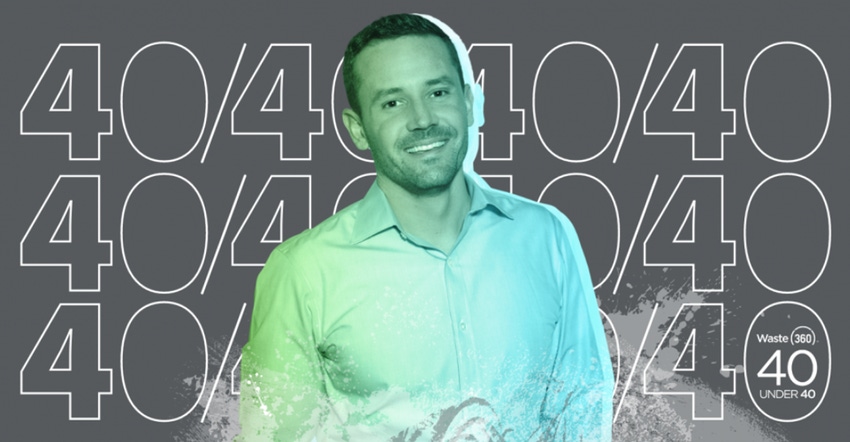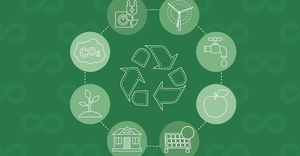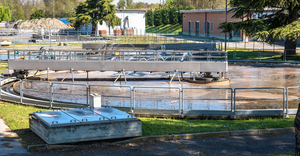
Leadership is key to driving change, especially when is comes to solving challenges around food waste.
For Kyle O'Keefe, Director of Innovation and Programs, Solid Waste Authority of Central Ohio (SWACO), stepping up was no question. The Waste360 40 Under 40 recipient was credited as the main driver behind the organization's Food Waste Initative, which led to SWACO's designation as 2020 Outstanding Recycling Organization of the Year.
Through his efforts waste diversion has increased from 32% to 50%. O'Keefe's ability to foster partnerships in Central Ohio has strengthened efforts around recycling, innovative research, grant funding and more.
In a Q&A with Waste360, O'Keefe discusses the importance of collaboration to solving issues surrounding waste in facilities ranging from hospitals to local municipalities.
What is your background and how did you get into waste?
Kyle O'Keefe: From an early age, I was just always interested in sustainable communities, what makes a community sustainable, and how we can do a better job of being designers. My father was a developer. He would build houses and small communities. And so I was always just kind of seeing this creative process, but also the amount of waste that was generated. Really, that it could just be done a lot better, and we have the capabilities to do it better. And so that just sent me on a path for most of my life to explore that and learn about it. I was introduced to permaculture - this is probably when it was before it became kind of wildly known over a decade ago now, and that's just all about design principles and how to eliminate waste. So that was really helpful.
What does your current role look like?
O'Keefe: Every day is is different. It's a really fascinating job. One day you might be working with the mayor of a community, the next you might be working with a local corporation here that's headquartered in the region, learning about what they can do or working with entrepreneurs who are just having an entrepreneurial pitch yesterday for folks in the region and how we might be able to collaborate with them. In the coming week, I'll be working with all the hospitals in our region to think about how they can reduce waste, or just a moment ago, I was working on a request for qualifications for a regional composting facility. It ranges very widely, but you're really kind of able to influence and be involved with the major planning and thinking for a region and how it manages its waste and how we work together to do that.
You mentioned working with a lot of different entities. What is needed to actually kind of help along the collaborative efforts?
O'Keefe: It's probably a little bit philosophical in some ways, but I think it's all about transparency and trust, just even just coming to the table and creating a comfortable space for people to engage. And being able to listen and ultimately provide support. I think everybody wants to do good at their heart. They want to find ways to collaborate with people, and oftentimes, they just don't have the right connections. They've got ideas that aren't fully matured and they need support. At the end of the day, we're here to provide that support, and we're here to be the keeper of knowledge and resources that we can distribute. It's really about just creating this environment, and I think if we can create the environment for that trust and helpful guidance, a lot of things begin to gel. For us, it's kind of having that sort of principle. Our work is all built around collaboration, which is just another point in general that I definitely would raise. This is also just all about partnerships. These are all people systems. They require working closely together. It's all about working with people. Using that, we're able to bring together folks, and also be known as an entity that does that becomes seen as a collaborator and a facilitator. That's really what we're trying to do, and without that, we really don't have much to stand on, quite honestly.
Where do you see the issue of food waste going in the future? Where do you see all these collaborations coming together to battle food insecurity and food waste?
O'Keefe: There are so many different competing agendas depending on who you ask or how you look at it. But I think that also is just representative of [the fact that] we need diverse solutions. There's no one silver bullet for addressing food waste, and we need a diversity of solutions. We also need to recognize that these systems are going to continue to evolve. How do we plan for evolving systems? For [SWACO] right now, I mentioned we are working on what does regional composting infrastructure look like? This is an issue that almost every community faces. There are only a small percent of communities who have really been able to address this in a well-designed manner. We're really trying to learn from others.
A lot of this is about communication and collaboration, working with folks like National Resources Defense Council and the World Wildlife Fund, and all these different partners who are at the table. I think this just comes down to education, making sure that there's awareness and making sure that it makes sense makes economic sense to divert and compost material. There's also this huge piece about feeding people in our community. We know, there are a lot of people that go hungry in the central Ohio area. We have great partners with the food banks and the food pantries. We are actively, day-by-day, seeing improvements in all of those areas. It's really about making sure that we can get these resources out to people, and that we can support them to implement them. All of this is largely voluntary under our current systems. I do think that three to five years from now, we will see more policies and requirements, but hopefully, we'll already have a very favorable environment for these types of things before those policies come into place.
What do you hope to personally accomplish in the future?
O'Keefe: One thing that I've been thinking about recently, and it's not so much an accomplishment, but it's also just, you know, I really appreciate being a public servant. I think it's a it's a, it's a huge and honorable responsibility that a lot of folks don't necessarily get to experience or necessarily always have that perspective. And So, you know, with that, really, I, my goal is to make sure that central Ohio is positioned as best as possible to make the most of its resources. And at the end of it, you know, for me, it's all about how we use our resources. And, you know, that's people that's materials. And by working together and aligning our common goals, you know, we can, we can accomplish almost anything. And so that's really it for me is making sure that our community is a better place. Whenever I'm done doing what I'm done, what I'm doing here.
About the Author(s)
You May Also Like




